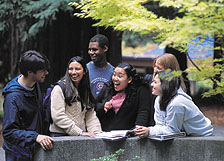|
March 10, 2003
New study bolsters case for affirmative action
By Jennifer McNulty
As the U.S. Supreme Court prepares to hear arguments next month in the
strongest challenge to affirmative action in decades, UCSC’s Thomas
Pettigrew has compiled powerful evidence of the value of policies that
encourage diversity.
|

|
| Policies that expand minority opportunities
lead to reduced prejudice, Thomas Pettigrew found. Photo:
Gary Parker |
Contact among people of different racial and ethnic backgrounds significantly
reduces prejudice, according to Pettigrew, a research professor of psychology
who recently completed an exhaustive review of more than 500 studies
on the topic.
"Separation limits the amount of intergroup contact we can have,
and that leads to greater prejudice, discrimination, and conflict,"
said Pettigrew. "Policies that expand minority opportunities create
optimal intergroup contact and lead to reduced prejudice."
A resounding 94 percent of the studies confirmed the basic theory that
contact with members of other groups reduces prejudice, a figure that
surprised even Pettigrew and his colleagues.
Pettigrew presented his work to about 60 people during a noon-hour
talk March 4 as part of the Diversity Lecture Series sponsored by the
UCSC Equal Employment Opportunity/Affirmative Action Office.
Pettigrew’s reformulation of the theory of intergroup contact,
which he defined as actual face-to-face interaction between members
of clearly defined groups, offers valuable insights into the ways in
which diversity reduces prejudice.
Most importantly, contact reduces prejudice against "outsiders"
by changing how people feel, which is the best predictor of intergroup
behavior, said Pettigrew. For example, having contact with African Americans
changes how whites feel about blacks, which turns out to be a far more
reliable predictor of their behavior than what they believe or the stereotypes
they hold, he said.
In addition, these findings hold true for prejudice based on sexual
orientation, age, mental illness, and physical disability. Moreover,
benefits were evident throughout the world, including such ethnically
stratified regions as South Africa, Germany, Israel, and the southern
United States.
In a South African study, Pettigrew said, white South African women
revealed less racial prejudice after contact with a black African housekeeper.
"Over and over again, we find that if we become familiar with something,
we come to like it," said Pettigrew. "Familiarity itself leads
to the liking."
Pettigrew’s findings were based on an exhaustive review, called
a meta-analysis, of studies on intergroup contact. With UCSC graduate
student Linda Tropp, now an assistant professor of psychology at Boston
College, Pettigrew enlisted the help of staff at McHenry Library and
12 undergraduates. The research team reviewed the findings of 516 studies
that encompassed nearly 1,400 tests and more than 250,000 subjects from
38 nations.
Pettigrew and Tropp subjected their findings to further analysis to
address the concerns of critics, including those who suggest plausible
alternative explanations for the documented reduction in prejudice.
One such alternative holds that people who are less prejudiced to begin
with seek out diversity and are more receptive to change.
True, said Pettigrew, but closer evaluation of the studies showed an
even stronger effect among individuals who had no choice about their
situations.
Other critics charge that all meta-analyses are inherently flawed because
they reflect a publishing bias for research that supports the hypothesis
being studied, in this case contact theory. Pettigrew and Tropp went
to extraordinary lengths to compare the findings of published and unpublished
studies and found an even larger effect in unpublished studies.
Pettigrew and Tropp also countered critics who charge that prejudice
is only reduced among the specific individuals with whom one interacts.
On the contrary, he found that prejudice against all members of the
"outsider" group declines.
Finally, the authors compared the strength of the effect among the whole
range of 516 studies, from the most rigorous to the least. The more
rigorous the study, he found, the stronger the effect.
Bolstered by such "robust" findings, Pettigrew believes social
policies that encourage intergroup contact, such as affirmative action,
are precisely what today’s multicultural world needs.
Responding to questions about separate graduation ceremonies, Latino-only
dormitories, and other race-based college programs, Pettigrew expressed
grave concerns.
"It’s always a tradeoff, but I think having your cultural
identity and maximizing contact are not necessarily in conflict,"
he said, noting that student demands for separate housing and academic
programs almost always emerge after students have given up on being
accepted as an "integral part of the campus."
"I remember a colleague’s observation that universities never
listen to minority demands until students are asking for segregation,
and then they respond with obscene haste," he added ruefully.
Return to
Front Page
|